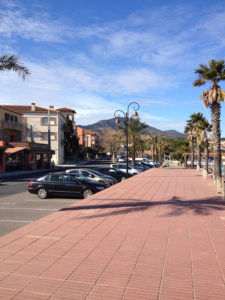Eternal Europe Will Endure
By Michele Reed
michele@cny55.com
Photos by Bill Reed
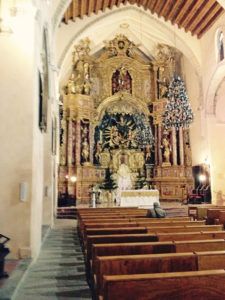
Like people all over the world, our travel plans were curtailed this year due to the global pandemic. As regular readers know, we head to France to escape Central New York’s snow from late January to mid-April each year.
Lucky for us, although we didn’t think so at the time, the biggest railroad strike in France’s history meant we wouldn’t be able to get from Barcelona airport to our home in France and had to delay our departure. The day the strike ended, we bought airline seats for March 1 and packed our bags.
We keep up with the news from France – and practice our language skills — by reading the local French daily newspapers online. So, on Feb. 29, when there had been only four coronavirus cases in all of France, and those in Paris hundreds of miles from our village, we read that the first local cases were found in a village just 10 miles from our home.
We scrambled to cancel our tickets, and after three days of negotiations with airlines, hotels and trains, we escaped with a loss of only the cost of one night’s stay in a New York City hotel. Not bad considering what the entire trip would have cost if we lost everything.
Now, as we sit watching the Oswego River flow by our apartment window, we dream about the day when we will be able to return to our beloved second home.
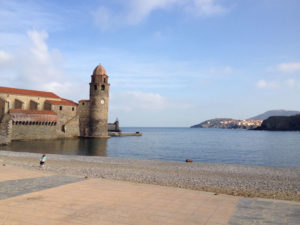
And what will we find there when we return? The world is changing daily, but as we’ve learned in our travels, Europe somehow endures. Invasions, wars and, yes, even plagues, have interrupted life there over the centuries but somehow, the indomitable spirit of the people remains strong. Their roots run deep in the soil of Europe, and their cultures and traditions are likewise enduring. The people themselves are resilient and tough. We saw it in Warsaw on a trip several years ago, where the Poles rebuilt a city devasted by World War II, and we see it in Beziers where our cathedral literally rose from the ashes of a fire that destroyed it during the Crusades in 1260.
We are confident that when we return to Barcelona, we will find the Cathedral of Santa Maria del Mar or Saint Mary of the Sea, a fisherman’s church which was on the front lines of a massive siege in the War of the Spanish Succession, still welcoming pilgrims. In its shadow, the eternal flame commemorating the Catalan heroes who gave their life in that historic battle of Sept. 11, 1714 will remain burning for three more centuries.
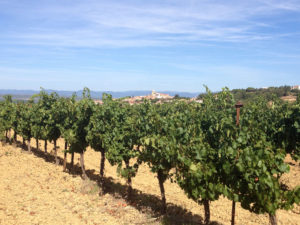
In France, as we write this in April, the people are confined to their homes, and gendarmes patrol the streets, imposing steep fines on anyone who is out and about without an appropriate government form. France’s cafes, a mainstay of the culture, are shuttered until at least July. Winegrowers fear for their harvest, as the itinerant workers who pick the grapes cannot travel to the vineyards. But those vines have endured since the days when Hannibal passed by on his way to cross the Alps in 218 BC, and they will be there two millenia hence.
France’s government has pledged that none of the businesses forced to curtail operations will be allowed to go under. The government will support them.
So, we can look forward to the day when our butcher, Monsieur Ramos, again teases us about not buying horsemeat or kidneys, two French delicacies we shun.
Or the day when Jacqui and Myriam at the cheese shop cut us a hunk of our favorite delicacy, Brie de Mieux, with a wink and a knowing, “Comme d’habitude?” (“Your usual?”)
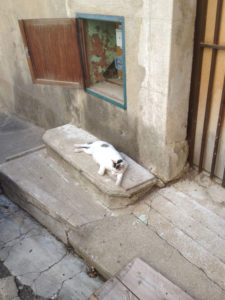
We’ll visit the Allees Paul Ricquet again soon, and Jean-Marc, the retired rugby hero who owns our favorite café, won’t even ask before bringing out two bottles our local craft beer.
But most of all, we look forward to seeing our dear neighbors. We’ve been writing back and forth, and Gilles promises us he has a bottle of sparkling wine he made and a foie gras chilling in his “frigo” (fridge) for the day we can enjoy an apero, or cocktail hour, again on our own rooftop terrace.
As enduring Europe has taught us, delayed doesn’t mean destroyed. The wait will only make our return that much sweeter.
